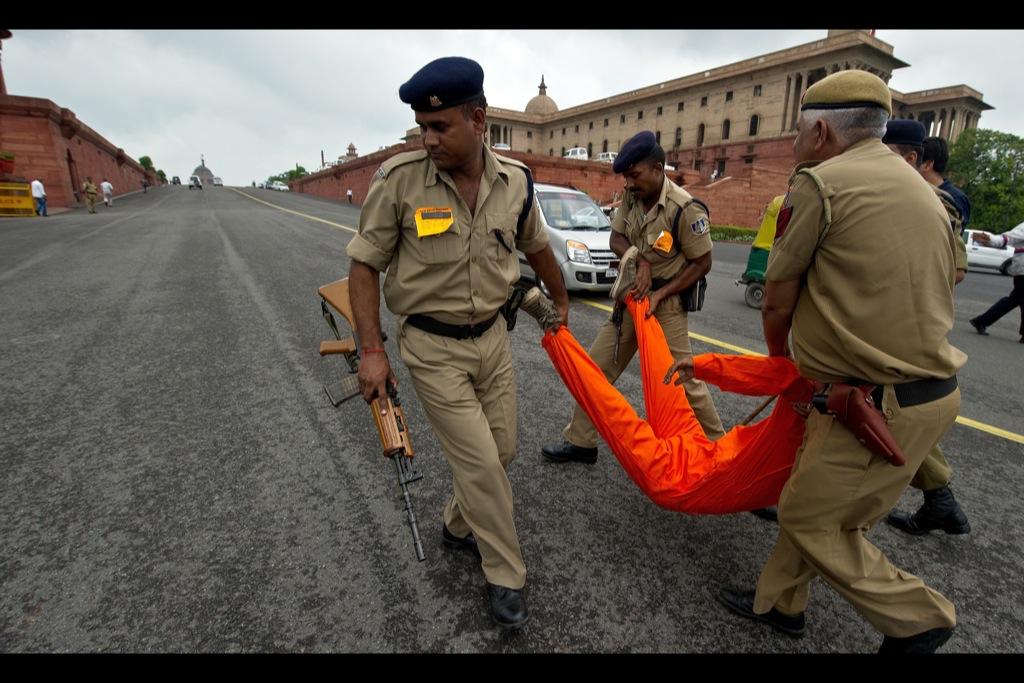India’s Coalgate: Anatomy of a “scam”
Delhi police and security personnel detain a Greenpeace activist dressed as a coal miner during a protest against the coal scam near Parliament in New Delhi on August 21, 2012.
India's Comptroller and Auditor General (CAG) released a contentious report last week, detailing its earlier claim that presiding officials including the prime minister cost the country billions of dollars by allotting coal mining blocks by fiat rather than auctioning them to the highest bidder.
But the real loss is not the theoretical $50 billion that the CAG says might have resulted from a transparent auction. Even worse than that, the beneficiaries of the cheap access to India's most needed minerals have not mined the ore — a big reason for the continued power crisis that resulted in a disastrous blackout for some 600 million Indians earlier this summer.
Yep. According to the CAG, officials passed "undue benefits" of over 3 trillion rupees (about $50 billion) to private parties by allotting coal blocks without an auction, as well as the development of the Delhi Airport development and the diversion of coal to a power project, the Hindustan Times reported Tuesday.
In the usual pointless exercise, the opposition called for the prime minister to resign. And we can expect the yammering about who was to blame to go on until the election, or the next 30 years if somebody can come up with a way to tie the thing to the Gandhi family. Zzzzzzzzz.
Here's my problem:
No doubt the allotment of these projects cries out for further investigation, and some heads should probably roll. But there's another reason that so-called "Coalgate" should mean more to the average Indian than the earlier "2G telecom scam" — another instance in which the government lost billions of theoretical dollars because officials allocated public resources without holding an auction.
Why? In the case of the 2G "scam," there was arguably a benefit for India, and Indians, from selling the telecom licenses cheap. Though there weren't too many players, competition was stiff, and operators swiftly invested the money they'd otherwise have spent on licenses to roll out their networks. In short order, there was a cell phone tower atop every third apartment building in cities like Delhi. You could find a stray signal even in the country's remotest corners. And carriers were offering service to regular folks — not just the middle class, but house maids, vegetable vendors and rickshaw pullers — at the cheapest rates in the world.
Corruption? Maybe, if the winners of the spectrum licenses paid cash to government officials to beat out their competitors. But it was the type of corruption that doesn't cost the consumer anything. In fact, everybody shared the benefits.
Coalgate appears to be a different story. With the money they saved because the coal blocks were sold cheap — even if it did require a few as-yet-unproven under the table payments — the companies that got the mineral rights should have been primed to fire up their mining operations at an unprecedented pace. After all, India desperately needs coal. And coal prices are pretty good.
Unfortunately, that's not what happened, according to another report in the Hindustan Times.
"A huge list of notices will soon be issued to a number of public and private power companies for slow progress on the development of coal blocks," the paper said. And the ministry is even considering taking some of the blocks back. The reason for the sudden interest? After the CAG report, people are asking questions.
That said, it's unclear whether or not the main culprits are the private companies that allegedly benefited from the bypass of an auction.
The HT cites an internal coal ministry note as saying that public sector companies alone, including NTPC and Damodar Valley Corporation (DVC), were allotted 14 captive coal blocks during the period with geological reserves of almost 7.8 billion tonnes of coal — sufficient to fuel power capacities of around 36,000 MW.
"However, only one block (Barjora North) has been made operational so far by DVC and the rest of the coal blocks are lying with these companies," the paper quoted the note as saying.
According to the HT, 142 blocks were allotted to government-owned and private companies since 2004, and 86 of them should have been producing ore by March 31, 2011. Only 28 of them were actually operating, at least in part because of local opposition and difficulty obtaining environmental clearances.
Oh, and of the 142 blocks, only 14 went to government-owned companies, as I understand it — though those seem to be the ones singled out by the ministry and/or the newspaper.
There is no paywall on the story you just read because a community of dedicated listeners and readers have contributed to keep the global news you rely on free and accessible for all. Will you join the 226 donors who have supported The World so far? From now until Dec. 31, your gift will help us unlock a $67,000 match. Donate today to double your impact!
